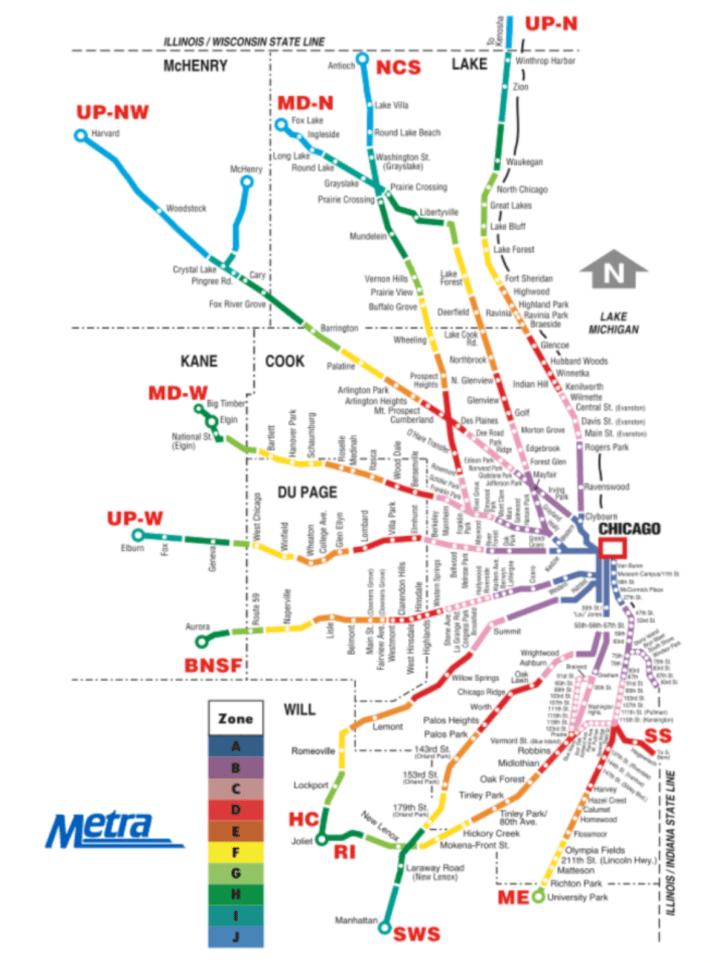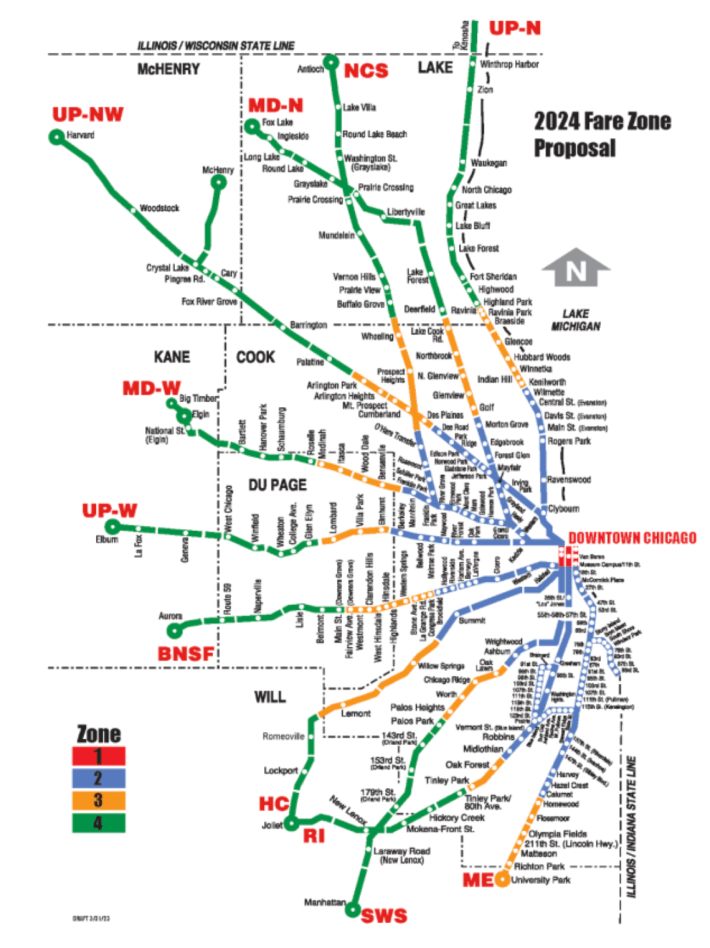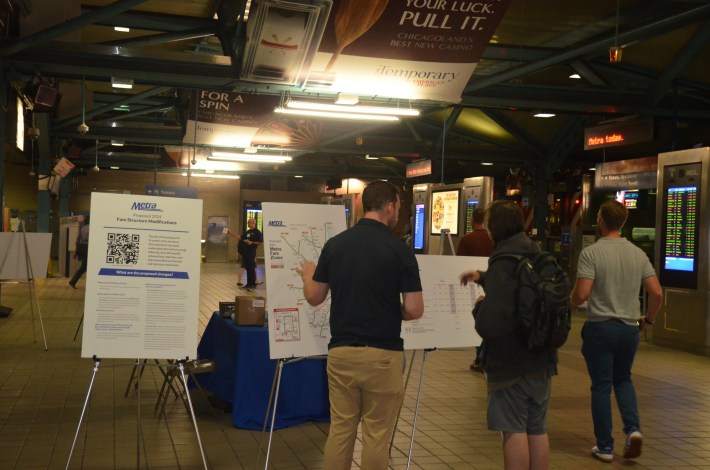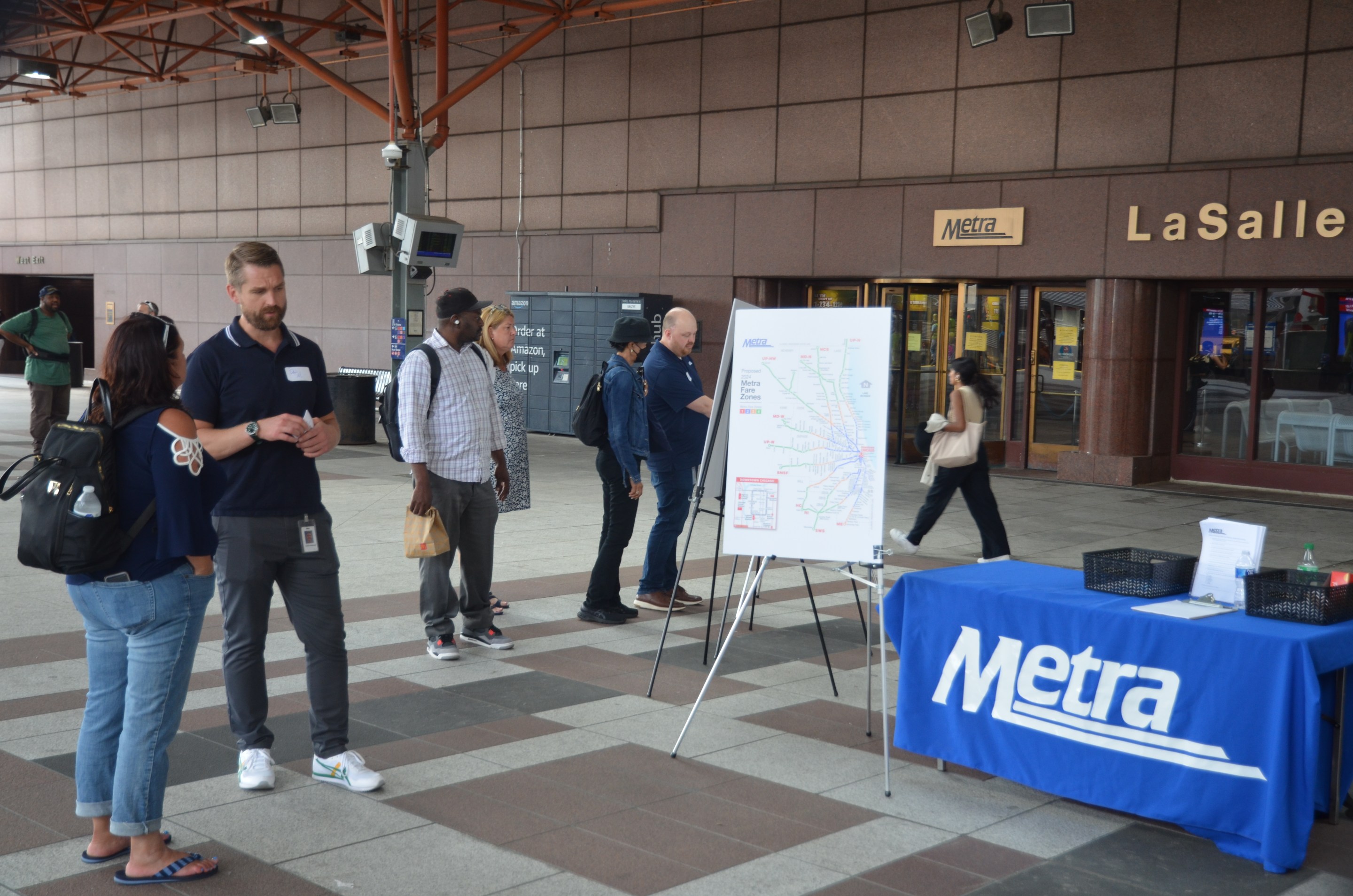By Igor Studenkov
While many who stopped by Metra information tables at downtown terminals weren’t happy about some aspects of the commuter railroad's proposed fare structure overhaul, plenty were, at the very least, willing to live with it.
Metra is proposing to reduce its number of fare zones from ten to four, charging a flat fare for riders traveling anywhere outside the Loop, and replacing system-wide monthly and daily passes with fare zone-based passes and getting rid of 10-ride tickets altogether. While Metra previously indicated that the changes would be approved in August, spokesperson Michael Gillis recently told Streetsblog they had been pushed back to mid-fall, to coincide with the adoption of the 2024 budget. To help get the word out and get feedback, Metra set up information tables and displays at all four downtown terminals.
Metra did its outreach at Millennium Station on July 19 and Union Station on July 26. Streetsblog attended the August 1 outreach at LaSalle Station, and the August 2 outreach at the Ogilvie Transportation Center, the terminal for the three Union Pacific lines. While at the LaSalle station riders frequently stopped by the tables and asked questions, at Ogilvie most riders walked by and were content with grabbing flyers with QR codes for the online survey. Gillis said that the response they got at Millennium Station was similar to that at LaSalle, and the response at Union Station was similar to that at Ogilvie.
It may be that Metra Electric District and Rock Island District riders had more at stake. Since January 1, 2021, they've paid reduced fares as part of the Fair Transit South Cook pilot. The CTA staffers told the riders the pilot would most likely expire on February 1, 2024. If the fare changes are approved, that would mean the riders on those two lines would pay less than they did before the pilot cut fares in half, but many would pay more than they have during the pilot. Gillis said nothing has been firmly decided yet, and he had no idea when the decision will be made. But he said that, unless Cook County decides to extend the pilot, it will indeed expire by default.
Fare changes

As we have previously reported, Metra is proposing to divide its lines into four fare zones. Fare Zone 1 will include all the Loop terminals, plus the MED line’s Van Buren and 11th Street/Museum Campus stations. Fare Zone 2 would include the rest of Chicago and about half of the suburban Cook County stations. Fare Zone 3 would include the rest of suburban Cook County, half of DuPage County, and a handful of stations in Lake County. Fare Zone 4 would include the remaining Metra stations.
The fare for anyone traveling within fare zones 2-4 would be the same amount as now: $3.75 for one-way ticket and $75 for monthly passes. For trips originating or terminating at Zone 1, riders would pay more the farther they travel.

If the Fair Transit pilot doesn’t get extended, the changes would represent fare hikes for MED and RID riders across the board. This would be especially noticeable for riders who travel within mostly Chicago-based fare zones A-C, where the $2.00 - $2.75 fares they have to pay now are similar to ‘L’ and CTA and Pace bus fares. At the LaSalle Station outreach event, Metra officials emphasized that would still be less than those riders paid pre-pilot. For example, riders traveling to any Hyde Park station paid $4.25 pre-pilot, but would pay $3.75 under the new fare structure.
Metra would replace the $100 system-wide monthly pass (the MED/RID-only version of which costs $75) with zone-based monthly passes. For MED and RID riders within the city and the nearby suburbs, this would maintain the status quo, but the prices will go up for Fair Transit riders further out. For other lines, the new monthly passes would represent a fare reduction in the city and near suburbs, preserve the status quo for much of suburban Cook and DuPage counties, and represent an increase for most collar county riders.
Metra is also proposing to get rid of $6 day passes that are good for up to three fare zones and $10 system-wide day passes, replacing them with what is basically a revived version of the former Round Trip Plus pass – a zone-based pass that costs the equivalent of two one-way tickets. Unlike the Ventra-exclusive original Round Trip Plus pass, the new day pass would be available in physical form in ticket offices and vending machines.
Finally, Metra proposes getting rid of a zone-based 10-ride pass, which costs the equivalent of nine one-way tickets, and replacing it with “a bundle of five-day passes,” a Ventra-exclusive pass that would offer five one-day passes for the price of 9.5 one-way tickets. Metra officials said that riders will be able to share the ticket with guests the way they can currently share both physical and digital 10-rides.

Rider reactions
Based on what Streetsblog observed at LaSalle Station and the Ogilvie Center, the one common concern came from riders who used Metra to come to the Loop 2-3 times a week – not enough to justify a monthly pass – and used either a 10-ride or one of the day passes. The Metra staff suggested either the Bundle or a monthly as alternatives, depending on how much they’re currently paying. Under the pilot, $6-day pass users would pay more for a new day pass, but the bundles would cost less than the equivalent 10-rides – unless they fall within the fare pilot.
An RID rider who currently travels from Fare Zone C noted that they pay $26.25 per 10-ride, but, assuming the pilot expires, they would have to pay $35.75 for a bundle. “The new math is baffling,” they said, “It’s good for you, but we the riders would have to pay more.”
Another RID rider complained that the new fare zone map would put the line’s Tinley Park stations – the downtown station (simply called “Tinley Park”) and Tinley Park-80th Avenue station, which are currently both in Fare Zone E – into separate fare zones. He pointed out that would mean riders using the latter station would pay more. Trey Blaise, Metra’s senior schedule and service design analyst, responded that this was deliberate, because Metra thought that downtown station would have “more potential” for express trains.
But when RID riders were told that the Fair Transit pilot was likely going away, the common response was either a resignation or a shrug, with many saying that “it was good while it lasted.”
While the officials treated the demise of the Fair Transit pilot as almost a done deal, Gillis said the possibility of an extension hasn’t been taken off the table. “We’re still talking to Cook County,” he said. “Everybody is trying to figure out how the program can evolve.”

Did you appreciate this post? Please consider making a tax-deductible donation.






